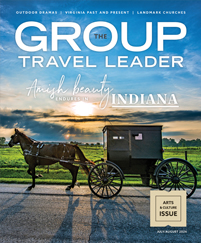Planning for anything
Unfortunately, dealing with anything that can possibly occur on a group tour can never be fully planned in advance. A successful group leader can never become complacent, however, and put him or herself in the position of being taken by surprise, should something completely unanticipated take place. In fact, those who tend to be easily flustered or unnerved “need not apply.”
In emergency situations, it’s very important to remain calm, cool and visibly “in control” to the group members. Alternately, becoming rattled, visibly upset or showing uncertainty can be disastrous.
Training in CPR, first aid and crisis management certainly provides excellent preparation for any group travel leader. But the most important factor in dealing with the unexpected is developing an unflappable state of mind. See to it that nothing will surprise you, and realize that there is always an acceptable solution to even the most daunting problem. Achieving this goal is critical to travelers retaining full confidence in your leadership abilities.
Schedules and Logistics
One’s prowess in scheduling tour timings accurately in advance is pretty much a function of that individual’s personal familiarity with the region through which a group will be traveling. Yes, there are general time and mileage charts that will help, although these are figured for individual automobile rather than motorcoach travel. Similarly, AAA Tour Books can frequently give a good idea of how much time should minimally be spent at a given attraction.
Ultimately, however, just like for the best salespeople, “knowing the territory” is the critical factor in separating those who are assured of getting the logistics right from those whose tours habitually run seriously late, or provide just a cursory “bus ride” rather than an a fulfilling travel experience. Topography, road conditions, elevations and the availability of rest and meal stop facilities are but a few of the factors that can seriously affect how long it will take a group tour to reach Point B from Point A on a map.
Because of this, relying on a professional to do a professional job is frequently the best course of action for a group leader who does not have intimate knowledge of the destination areas to be visited. Incidentally, one of the most common mistakes made by the beginning tour planner is including too much in an itinerary for the available time. You must remember that everything takes substantially longer for a group than for an individual traveler.
Keeping your group entertained
On-board entertainment can depend on a host of factors, including a tour director’s skills in keeping group members informed and/or entertained, and the receptiveness of those travelers to his or her efforts.
Some TDs have incredible knowledge of history, geography and the natural sciences, and can keep their “audiences” fascinated with a continuous stream of information. Others have vocal talents and enjoy leading the group in song, or a library of recorded music and/or movies appealing to the group members to keep them entertained en route. Still others might be accomplished storytellers or have a raft of interesting games and puzzles, with prizes to be awarded to the winners.
Chances are that the most successful TDs can call upon a pleasing combination of such diversions. And, of course, there are likely to be times on every tour when it is best to let group members simply relax or sleep.










